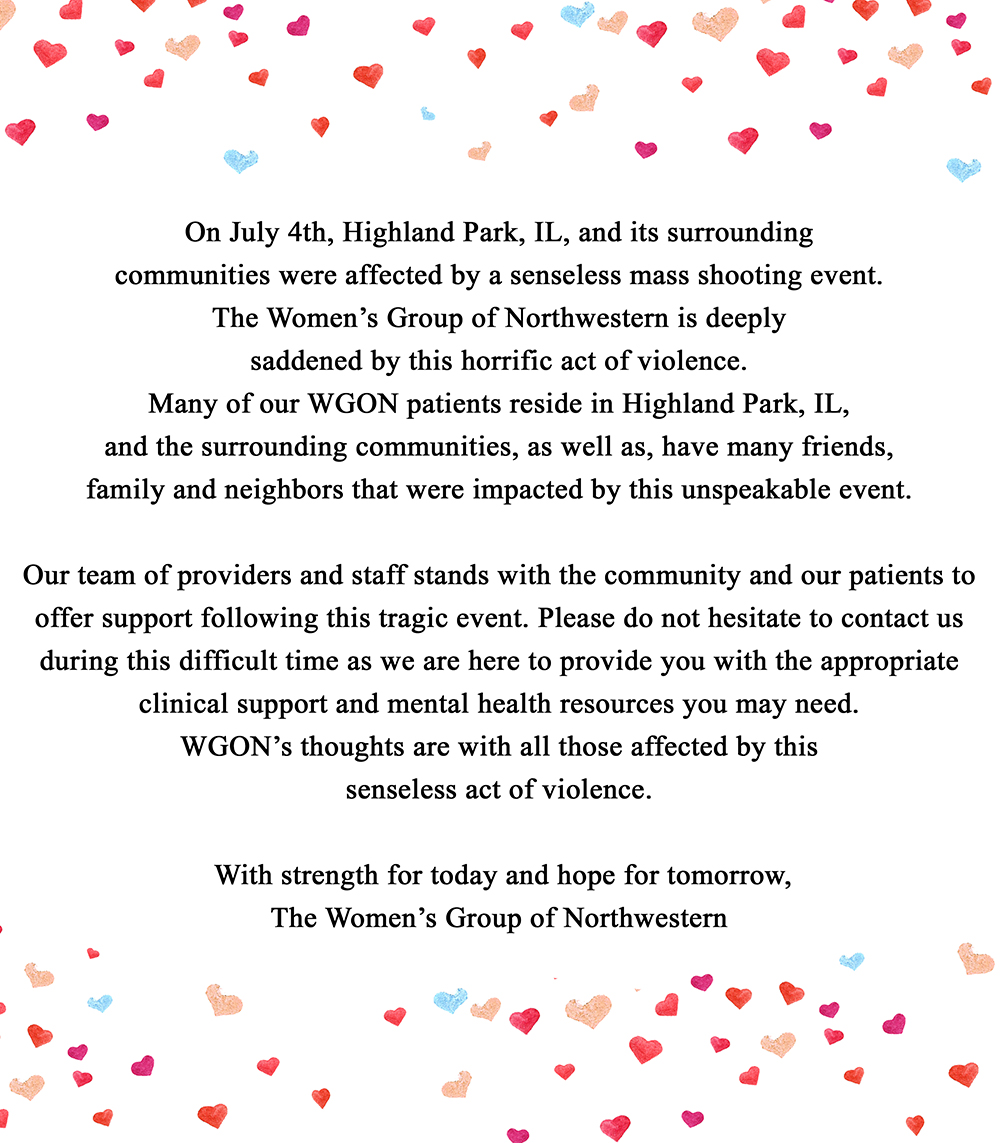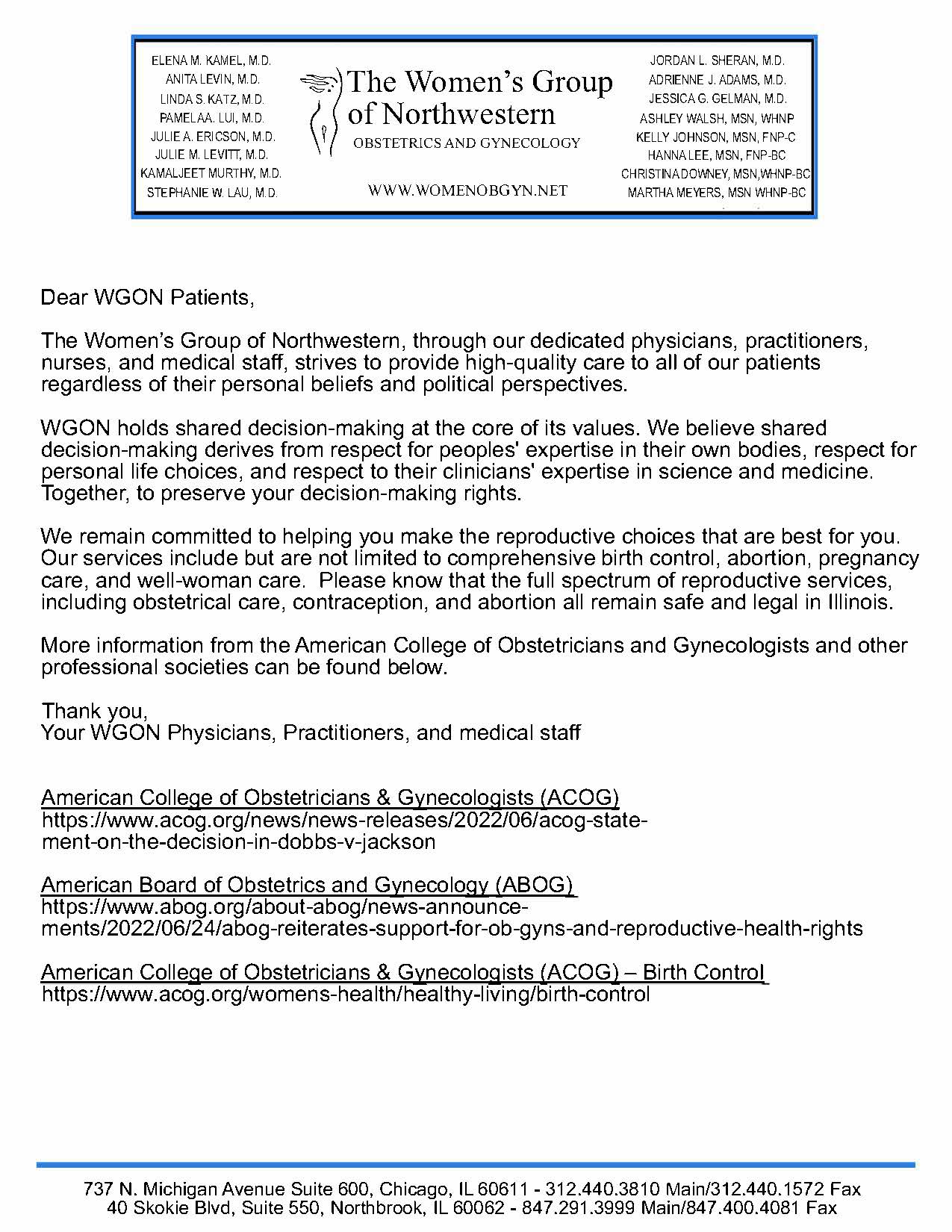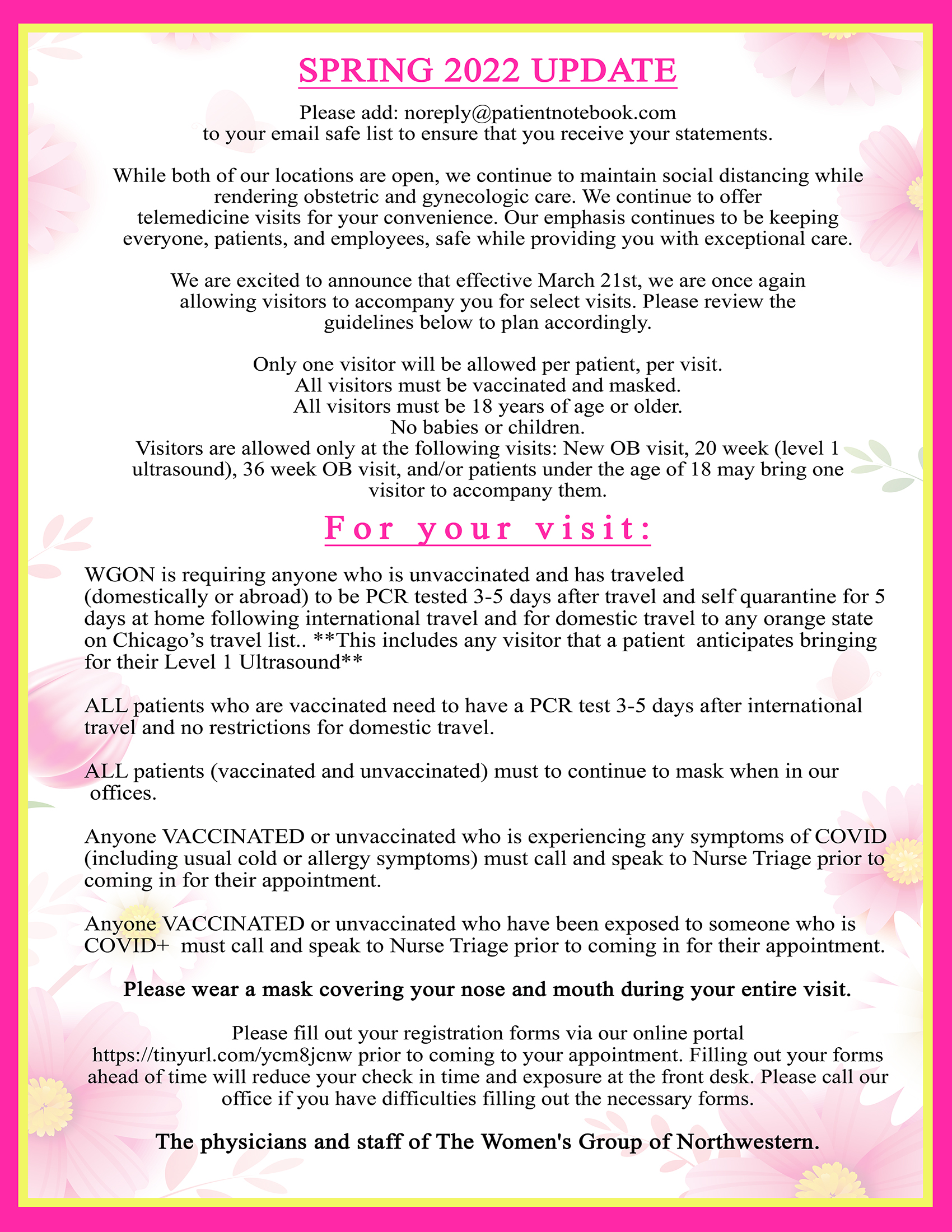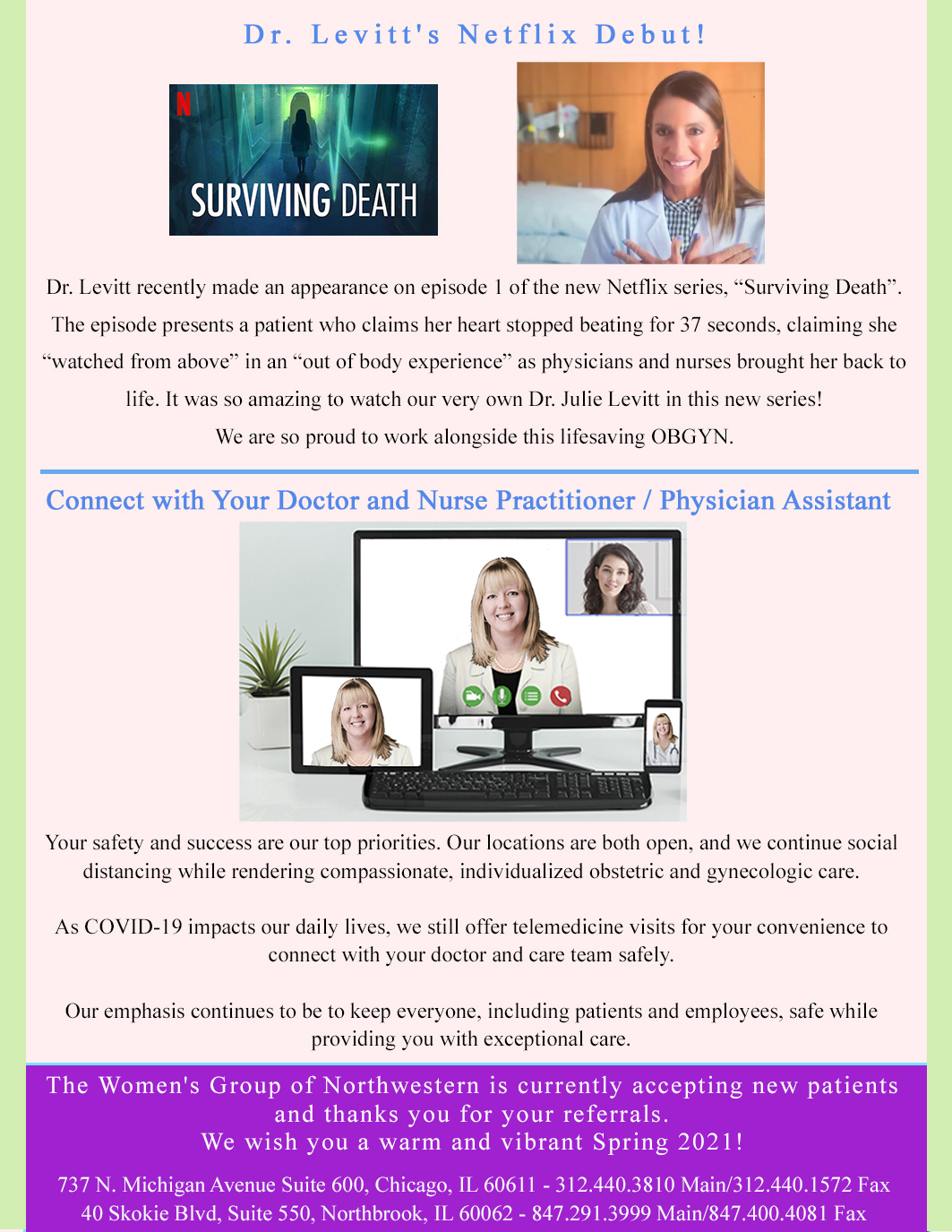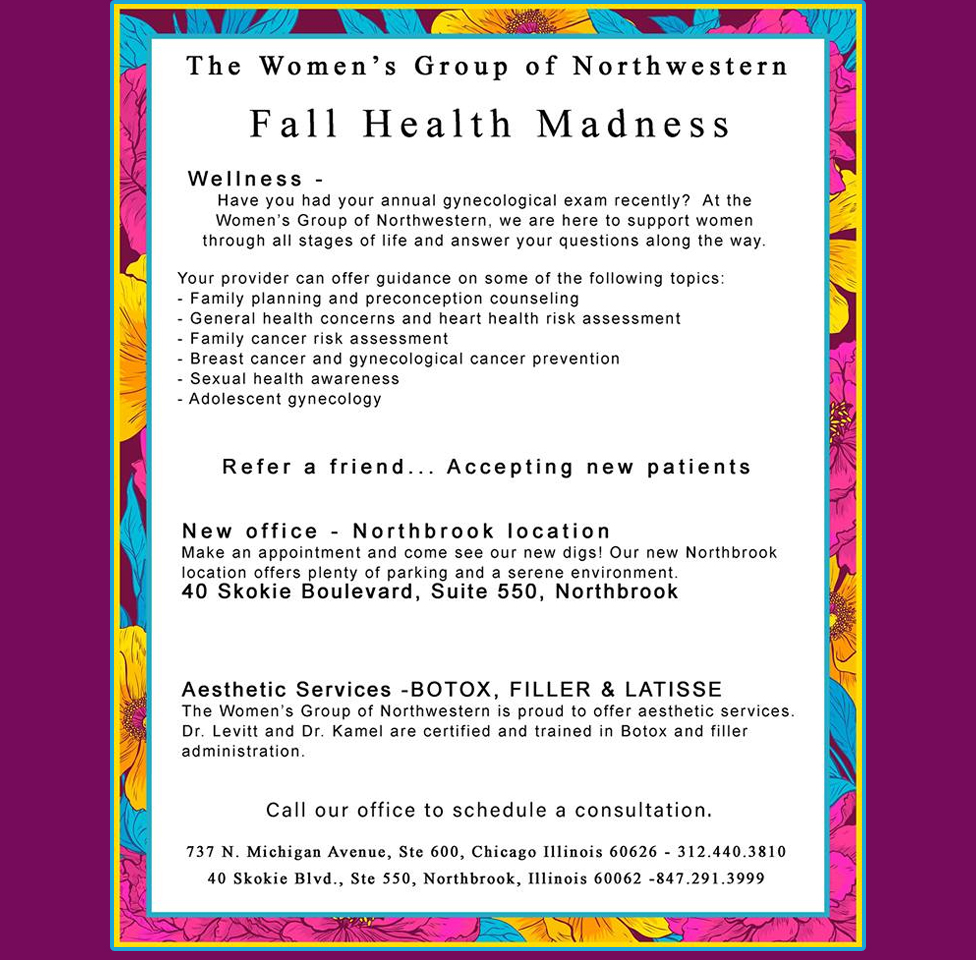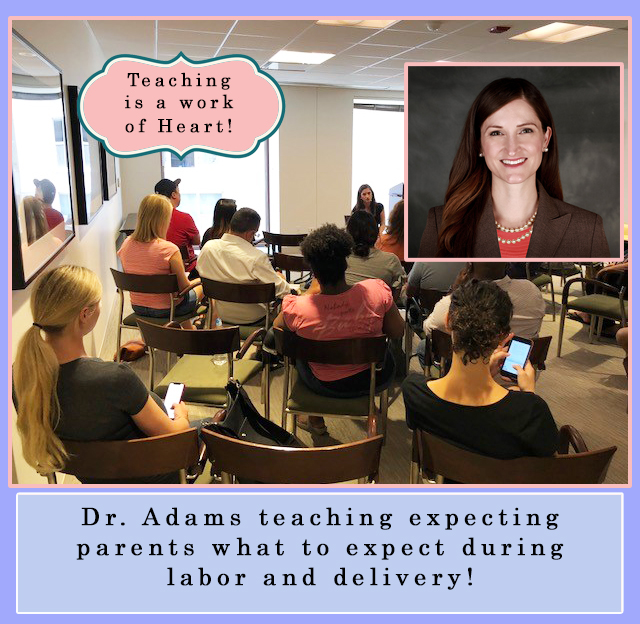

The Women’s Group of Northwestern would like to wish you and your family a safe and Happy Halloween! We are celebrating the newest pumpkins to our patch with Dr. Salamon, Nurse Practitioners Ashley Walsh and Kelly Johnson, and Manager Jessie Kinyon.
“Let’s talk about Uterine Fibroids”
by Dr Jordan Sheran:
 Your monthly menstrual cycle can be a disruptive time in your life each month, especially if it is heavy and painful. There are a variety of reasons your cycle may be more heavy or painful, though two very common reasons are Endometriosis and Uterine Fibroids. Endometriosis is a condition when the lining of your uterus starts growing outside the uterus and is known to occur in about 1 in 10 women of reproductive age. Uterine fibroids are benign (non-cancerous) growths that develop from the muscle tissue that makes up the uterus.
Your monthly menstrual cycle can be a disruptive time in your life each month, especially if it is heavy and painful. There are a variety of reasons your cycle may be more heavy or painful, though two very common reasons are Endometriosis and Uterine Fibroids. Endometriosis is a condition when the lining of your uterus starts growing outside the uterus and is known to occur in about 1 in 10 women of reproductive age. Uterine fibroids are benign (non-cancerous) growths that develop from the muscle tissue that makes up the uterus.
In the past treatment for both conditions was limited to trying to control heavy bleeding with hormonal contraceptives (e.g., birth control pills or IUDs) or surgical management. New medical therapies are now available for management and may be a good option to discuss with your physician if you are experiencing heavy painful periods or if you have been unsuccessful in treating these symptoms in the past.
There is currently a new medication available for pelvic pain associated with endometriosis known as Elagolix (brand name Orilissa), which acts to create a low estrogen state in your body. This hypoestrogenic environment restricts the growth or proliferation of the endometrial (uterine) implants which cause the pain associated with endometriosis. It is a pill which can be taken once or twice daily and has been shown to significantly decrease the pain associated with endometriosis and improve quality of life. Another form of Elagolix combined with hormones (brand name Oriahnn) has also been approved to be used to reduce the heavy menstrual bleeding associated with uterine fibroids. Research demonstrated an improvement in bleeding in 88% of participants within 1 year of use. In addition to reduced blood loss, patients also demonstrated a reduction in the volume of their fibroids, thereby offered some potential relief of the bulk like discomfort that can occur with an enlarged fibroid uterus. Another medication known as Relugolix is currently approved in Japan for use in the reduction of heavy menstrual bleeding associated with fibroids and is currently being investigated in the United States as a potential additional FDA approved medical option for treatment.
If you are suffering from heavy, painful menstrual cycles and you have not addressed this issue with your physician or you feel that your choices for treatment were limited in the past, it may be time to readdress the symptoms and options with your doctor.
If you are interested in hearing more about these options, call 312.440.3810, to schedule a consultation with Dr. Sheran.
Best Hospitals for Maternity
U.S. News & World Report has begun collecting data from hospitals nationwide for its inaugural edition of Best Hospitals for Maternity, which will be published in the fall of 2021. Here is a link to the article. As you can see, our NMH-Prentice stands out among this distinguished group by demonstrating some of the top metrics.
As an Honor Roll hospital, NMH had been asked to participate in the pilot survey, and submitted data on four measures:
- Cesarean birth rate in low-risk women
- Rate of exclusive breast milk feeding
- Unexpected complications rate in term newborns
- Support vaginal birth after Cesarean (yes/no)
We are excited to announce The Women’s Group of Northwestern will now be offering Preconception, Breast feeding and Prenatal classes!
Ask your provider about our new prenatal classes:
“What to expect before you’re expecting”, “Make room for baby!” and “A mother’s guide to breastfeeding!”
“What to expect before you’re expecting” will cover topics such as nutrition for fertility, why preparing for pregnancy matters, lifestyle factors to optimize fertility, monitoring your cycle, ovulation and much more…
Our Prenatal Class covers topics such as Pregnancy & Basic Nutrition, Labor & Delivery, Postpartum Care & Breastfeeding and Newborn Care.
Our Breastfeeding class covers, why breast milk is best, production of breast milk, skin to skin, latching and so much more… Classes are offered in the evenings and on some Saturdays. Ask our receptionist for more information
Call our office at 312.440.3810 to register.
We hope that you will be able attend. We look forward to seeing you at your next visit.
Our very own Dr. Julie Levitt contributed to this article on “Understanding the different types of emergency contraception and how to choose which is best for you” with INSIDER . com – Click on the link to learn more https://www.insider.com/types-of-emergency-contraception-how-to-choose#birth-control-pills-(yuzpe-regimen)
March is Colorectal Cancer Awareness Month! For more information visit: https://www.cancer.org/…/detec…/acs-recommendations.html
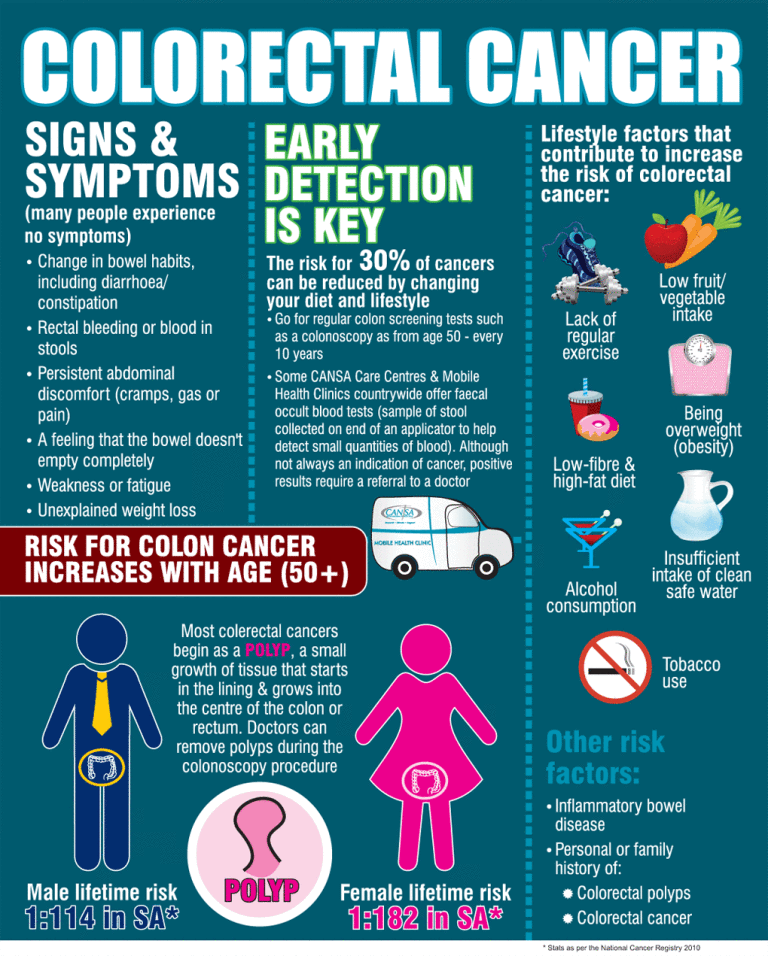







It was so amazing to watch our very own Dr. Julie Levitt in @Netflix new series Surviving Death! Proud to work alongside this lifesaving OB. Have you tuned in?
Announcing our new prenatal class schedule! Call us to reserve your spot… 312.440.3810 #chicagoobgyn #chicago #chicagoparent #chicagoprenatal #thewomensgroupofnw #magmile #chicagobaby
Our very own Dr. Julie Levitt was interviewed for an article regarding Dreaming and pregnancy for Live Science

The anxiety and physical discomforts of pregnancy can play out in dreams — or nightmares.
Credit: Shutterstock
The fractured logic and mystifying images that appear in dreams can be downright bizarre for anyone. But one of the hallmarks of pregnancy seems to be the onset of dreams that are unnervingly intense or that seem stranger than usual.
Back in May, pop singer Cardi B, who welcomed her first baby last Tuesday (July 10) — tweeted about experiencing “weird, crazy, spooky dreams,” writing in a second tweet that all of her dreams were “too vivid.” And she’s not alone. Studies have found that pregnant women reported more nightmares and more intense dreams than nonpregnant women, and that women in the last trimester of their pregnancies described more frequent nightmares during that stage than during the earlier trimesters.
What is it about pregnancy that causes troubled dreaming? Turns out, it has to do with troubled sleeping. [7 Mind-Bending Facts About Dreams]
Bring me a dream
The human sleep cycle has five stages, one of which — rapid eye movement, or REM — makes up about 25 percent of sleeping and is the stage when most dreaming occurs, according to the National Institutes of Health. When you fall asleep, you enter the first REM stage after about 70 to 90 minutes, and REM sleep occurs several times during the night as your sleep cycle repeats.
As you dream, your brain is actively sorting through recent experiences and emotions, and dreaming is thought to play a role in memory consolidation and processing new information, Dr. Ryan Donald, a physician and assistant professor of sleep medicine at The Ohio State University Wexner Medical Center, told Live Science.
But if a person’s sleep cycle is broken and they wake up during a REM stage, they would be more likely to vividly recall what they’re dreaming — and pregnant women often experience disturbed sleep at different pregnancy stages, according to Dr. Julie Levitt, an OB-GYN and clinical instructor at Northwestern Medicine in Chicago.
“Rising progesterone levels in the first trimester can trigger insomnia — that’s fairly common,” Levitt told Live Science. That usually abates at 12 to 16 weeks into the pregnancy, but the onset of the third trimester, about 28 weeks and beyond, brings increasing physical discomfort that can disrupt nighttime rest, she explained.
“Quality of sleep is the poorest right before you’re about to deliver the baby,” Levitt said. “You have to get up to pee at night, or you might snore, or have sleep apnea.” (People with sleep apnea experience very shallow breathing or pauses in breathing while they’re asleep.)
Restless legs syndrome, a disorder that causes an intense urge to move the legs, can also manifest during pregnancy and interrupt much-needed sleep, Donald added. Frequent sleep disruption increases the likelihood of waking up during the REM stage of the sleep cycle, which makes dreams seem more immediate, intense and memorable, Donald said.
“Lower sleep quality, shorter sleep duration, more interruptions during sleep: These all can increase the likelihood of remembering dreams,” he said. [Is ‘Pregnancy Brain’ Real?]
A dream to some, a nightmare to others
Pregnant women also report more frequent nightmares, many of which have to do with childbirth or danger to the newborn baby, according to a study published in November 2016 in the journal BMC Pregnancy and Childbirth. Researchers surveyed 406 pregnant women, ages 17 to 44, and found that they reported nightmares more than twice as often as women who were not pregnant, and that those nightmares were often baby-related.
Pregnancy, particularly the third trimester, is a period of heightened stress; perhaps increased daytime stress for pregnant women could explain why nightmares are more frequent during pregnancy, the scientists wrote.
Another study, published in June 2014 in the journal Sleep Medicine, surveyed 57 pregnant women who were in the last trimester of their pregnancies; 32 percent described having weekly nightmares, and 21 percent reported more than one nightmare per week.
Levitt experienced nightmarish dreaming firsthand during her own pregnancy, when she dreamed that she gave birth to a litter of puppies, she told Live Science.
“You have these dreams, and you’re like, ‘What in the world? Where did that come from?'” Levitt said. “I think it’s based on things people might worry about on a day-to-day basis. A lot of the daytime fears that we walk around with tend to reveal themselves in dreams at night.”
Original article on Live Science.
https://www.livescience.com/63069-why-weird-dreams-pregnancy.html
A big thank you to everyone that donated to the Medical Supplies Drive. We wanted to share a video of the delivery of supplies to Puerto Rico. Together we made a huge difference in many lives.
“Try to be a rainbow in someone’s cloud”. Maya Angelou
Printable Puerto Rico hurricane relief flyer
We are excited to announce new dates for The Women’s Group of Northwestern prenatal classes! Our prenatal classes will cover topics such as Pregnancy & Basic Nutrition, Labor & Delivery, Postpartum Care & Breastfeeding and Newborn Care. Future classes will be held in the evenings and weekends on certain dates in July, August, and September. Call our office at 312.440.3810 to register. We hope that you will be able attend. Thank you very much and we look forward to seeing you at your next visit.




